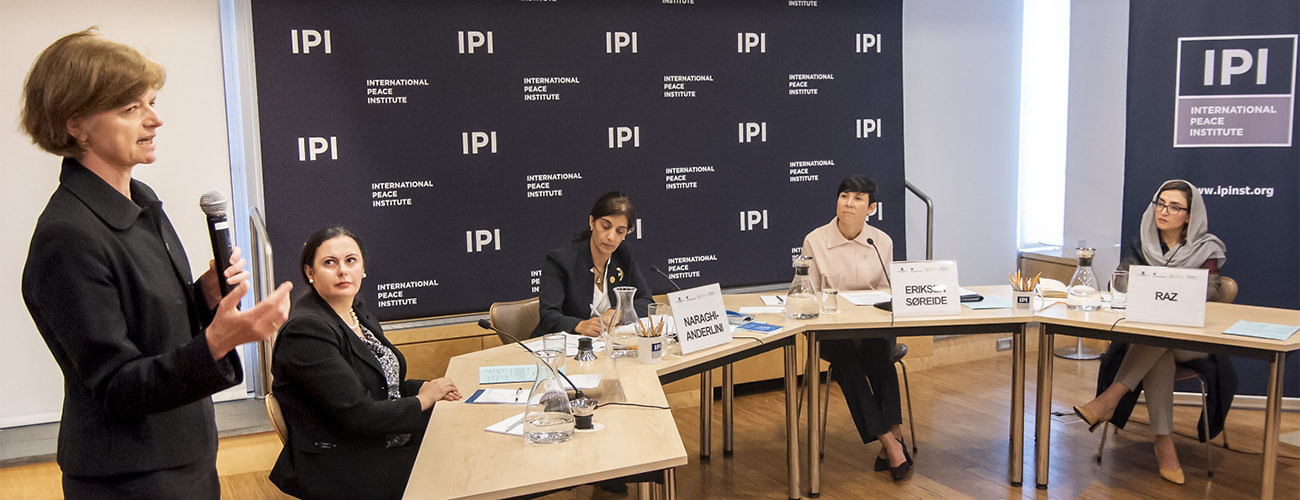Only two percent of the mediators in formal peace processes from 1990 to 2017 were women, and this significant and persistent underrepresentation was the subject of a wide-ranging September 26th discussion at IPI.
Setting out the problem in introductory remarks, IPI President Terje Rød- Larsen said, “Research increasingly shows that peace processes that substantively include women tend to result in more durable, sustainable peace, yet exclusion continues, despite the targeting of women and girls in conflict and the crucial insight of local women peacebuilders.”
Sanam Naraghi-Anderlini, Founder and Executive Director of the International Civil Society Action Network (ICAN) and moderator of the event, posed the question bluntly. “How do we move beyond apathy, ad hockery and amnesia to caring, consistency and commitment for women’s inclusion?” she asked.
Ine Eriksen Søreide, Minister of Foreign Affairs of Norway, said it was her experience that “it doesn’t matter how you include women, as long as you include them. The point isn’t the model, the point is to do it, one way or another.”
Norway is often invited to facilitate talks, she said, but agrees to do so only if the assembled team is composed with gender balance and female envoys. “We say that Norway comes with conditions, including inclusivity,” she said. “When we gathered a network in Oslo, one of my agendas was to convey a message that it wouldn’t be possible anymore for someone to say, ‘We would like to have had a female mediator but couldn’t find any’ because we showed so many of them.”
She noted that the conversation was focusing on civil society women peacekeepers and asserting that they should be treated as full participants, not just observers, in peace talks. To bolster her case, she cited Nobel Peace Prize winner Leymah Gbowee’s comment that “women are not observers of war, why they should be observers to peace?”
Adela Raz, Deputy Foreign Minister for Economic Affairs of Afghanistan, said her country had made progress in increasing the number of women negotiators but questioned how seriously they were being taken. “We realized that the commitment from leadership to bring them on board is just representation, but do they actually participate? We struggle with that second part, ensuring an actual space to speak and be part of the negotiation.”
She stressed that the situation would have to change. “Afghan women are not the women of 15 years ago when we didn’t know our rights,” she said. “We are loud, confident, determined, and will make sure our voice is heard.”
Fatima Abo Alasrar, Senior Analyst for the Arabia Foundation and member of the Women’s Solidarity Network of Yemen, said that in her war-torn country there was a serious “disconnect right now between the talks and the realities and needs of people on the ground.” She said that the parties to the ongoing war, both the government and or the armed factions, are “afraid of including women because we do not support this side or that. We call out abuses on all sides, and we are working towards a vision of sustainable peace for our country.” She also aired a warning for the future. “We should not be treated as an add-on; we are an integral part of the process,” she said.
Agreeing with her was Lord Ahmad of Wimbledon, Minister of State for the Commonwealth and the UN at the UK Foreign Office and the Prime Minister’s Special Representative on Preventing Sexual Violence in Conflict: “We often say, ‘Let’s empower women, women are there and have voices,’ but it’s about amplifying. The table is one table, the women are part of that process. We need to design processes that are inclusive from the outset. Women are active already. It is incumbent on us to amplify their voices.”
Theresa Whitfield, Director of Policy and Mediation Division of the UN Department of Political Affairs, also pointed out the importance of women being involved from the beginning. “They should be starting early, having teams with gendered expertise conducting gendered analysis of conflict and building relationships so women peacemakers are known to all international actors,” she said. She also emphasized the importance of consistent mandates and accountability from the Security Council.
Rajaa Altalli, co-director of ICAN’s Center for Civil Society and Democracy, expressed concern over whether peacekeepers were being protected. “There’s no legal framework or resources for protection,” she said. “In each conflict, we face the same issues at local and national levels. Who is protecting peacebuilders? We need protection and resources to be there.”
“Gender equality is a question of power,” said Ana Maria Menéndez, Senior Adviser of the Secretary-General on Policy. “Unless women reach the power that men have had traditionally, we won’t get there, and that applies to every field and certainly to mediation.” She added that this was also the responsibility of member states as well as the UN.
Ms. Naraghi-Anderlini concluded the event with a series of takeaways, among them:
- The design and process by which we ensure inclusion of women peacemakers may look different from one context to the next.
- The inclusion of women peacebuilders should be integrated into all Security Council mandates.
- Gender expertise in a team is essential from the outset and should not be “parachuted in” too late.
- A new resolution from the General Assembly and the Security Council is needed to demonstrate respect and protection for civil society peacemakers.
The meeting was co-sponsored by IPI, ICAN, the Ministries of Foreign Affairs of Norway and of Afghanistan, and the UK Foreign and Commonwealth Office, and organized in line with IPI Research Fellow Sarah Taylor’s work on women, peace, and security. The moderator was Ms. Naraghi-Anderlini.








